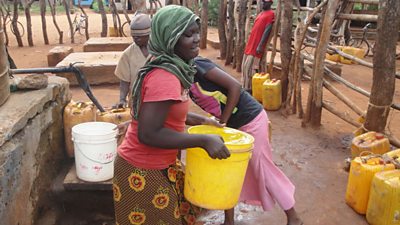Downloads
… I have always known that the members of parliament are the ones who are going to help us but what I learnt is that they cannot help us in everything we want … citizens have to initiate whatever they want then the members of parliament help them from there.
This research reports on the feedback from audiences of the weekly discussion programme broadcast by the ±«Óătv Swahili service, Haba na Haba.
Publication date: September 2013
Haba na Haba is a weekly discussion programme broadcast by the ±«Óătv Swahili service. The programme covers issues relevant to local communities in Tanzania and invites politicians and public figures into the studio to address concerns raised by the programme and audiences.
Haba na Haba (Little by Little) is a weekly talk show broadcast on ±«Óătv Swahili in Tanzania. The programmes feature reports produced by six local community based radio stations across the country. Issues of concern such as political engagement and social welfare throughout Tanzania are discussed and politicians and public figures are invited onto the programme to address the concerns raised.
Research approach
The ±«Óătv Media Action research team in Tanzania conducted 23 panel discussions with adult men and women in six locations across Tanzania to gain audience feedback on Haba na Haba. The discussions aimed to understand audience perceptions of topics covered and the overall style, tone and format of the programme with a view to informing future programme development. Discussions were based on episodes focusing on e-governance, pension funds and the role of Members of Parliament in their constituencies. The panel discussion involved playing an episode of Haba na Haba to the audience and holding a moderated discussion afterwards. This data provided an opportunity to monitor audience opinions of Haba na Haba in order to inform the development of future programmes.
“This programme is giving civic education which everyone has to know about. The programme is not based on any political side, neither is it based on any age limit so I can be free to discuss it with anybody.” - Male Participant, Dar es Salaam
Key findings
- Overall, Haba na Haba was well received among participants, particularly its coverage of a variety of social and political issues across Tanzania.
- There was a high level of trust in the programme among participants, as it addressed topics that affected their communities and reflected the voice of the ordinary Tanzanians.
- Participants particularly appreciated programmes on issues such as the role of Members of Parliament and pension funds. They felt the points covered in these programmes could be put to use in their own lives, for example knowing how to select an elected representative or realising the importance of getting a pension plan to assure future security.
- By contrast, an e-governance discussion was felt to be too exclusive due to the nature of the topic and the technical language used. This was particularly evident for rural audiences.
- Participants felt the programme offered an opportunity to challenge government officials in Tanzania and hold them to account. Participants perceived that officials wanted to come onto the programme to answer questions.
- A preference for inviting government officials with the power to initiate change was reported, indicating participants’ belief the programme has a role to play in holding government to account.
Project context
Tanzania is one of the most politically stable countries in Africa. Among media, radio predominates and there are dozens of private FM stations, with many broadcasting news from international media. The ruling Chama Cha Mapinduzi (CCM) party dominates Tanzanian politics and there is a culture of not questioning or criticising the state.
±«Óătv Media Action has produced and broadcast governance programming in Tanzania for five years with support from DFID. In March 2012, the talk show Haba na Haba (Little by Little) was launched in order to address issues that matter to local communities across Tanzania. The programme gives people a national platform where they can put their concerns and questions to their leaders.
Implications and impact
Panel participants appreciated and trusted Haba na Haba. Participants appreciated journalists reporting from different parts of the country on diverse topics. They said the programme dealt with issues their communities faced, gave a voice to ordinary people and helped to hold the government to account. Participants particularly appreciated a programme on the role of MPs in their constituencies as it provided them with the information necessary to choose a candidate. Participants felt it was challenging for citizens to complain about the lack of availability of their elected representatives. In addition, the programme highlighted constituency funds for community development projects that many had not known existed. Participants also spoke of how the programme had highlighted the role of citizens in taking responsibility for initiating political change.
However, participants felt e-governance was not discussed in simple enough terms and was irrelevant to rural audiences. Participants also said leaders invited on to the show should be directly involved in or responsible for the topic being discussed.
Haba na Haba, overall, was viewed as a programme that provides a meaningful forum for discussion between leaders and citizens. Participants felt that the programme offered an opportunity to challenge government officials in Tanzania and hold them to account. Participants perceived that officials wanted to come on to the programme to answer questions.
